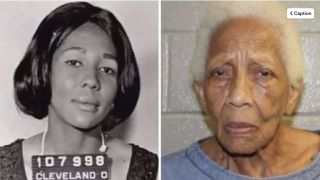
Doris Payne mug shots
Cleveland Police Department / public domain / Used with permission
Famous jewel thief Doris Payne, born in coal-miner country the youngest of six siblings in southern West Virginia in the heart of Appalachia, made it her lifetime pursuit to steal jewelry from high-end shops.
Her criminal career dates back officially to 1952. But this October marked the anniversary of her first admitted theft a decade earlier at age 12, which was 1942. Then and now, Payne has never shown an ounce of remorse. When asked, her response is always the same.
“I’m not sorry,” Payne told me in an interview.
She’s also enjoyed the media attention she’s received over the years, often personally reaching out to reporters herself to garner even more press.
Some experts classify kleptomania as an impulse control disorder. For Payne, it became her guilt-free job and afforded her expensive clothes and shoes, overseas travel, nice cars, and a house for her two children – and gave her the satisfaction of retribution toward the first store clerk who embarrassed her in her youth.
That first theft while in grade school was a wristwatch from a local jeweler, because, she explained, the shop owner was rude to her when she asked to see the watch. When he looked away, she snatched it and left the store without being stopped. To her, stealing the watch was a skill she wanted to perfect. That moment in the jewelry store also left her feeling as if the world owed her a favor for being slighted by the shop owner.
Thus began what became a rash of fine jewelry thefts that would take Payne around the world. Along with theft skills, she perfected a soft, sweet persona as well as an air of confidence to fool store clerks into believing she was a real customer.
Traveling in 1952 from her home, which at the time was in Cleveland, Ohio, to Monte Carlo, Monaco, she pulled off her biggest heist. For two days, she walked the French Riviera, window shopping at the finest jewelry stores in Europe. On the third day, she walked into Cartier at Place du Casino in Monaco, posing as the wife of a film director, and swiped a 10-1/2-carat, emerald-cut diamond ring in a platinum setting. Then she walked out and caught a cab to the Nice, France airport with plans to fly to New York City to sell the diamond. Once at the airport, however, authorities approached her.
Undeterred, Payne’s only thought, she said, was, “Where do I hide the diamond?”
Before police reached her, she quickly managed to hide the ring in the seam of her girdle. Because there was no women’s jail in Monaco, they housed her in a hotel room, allowing her to keep her wallet and suitcase with her. While there, she continued hiding the diamond in her undergarment.
Next, she complained of being sick and they took her to the emergency room of a hospital. She soon asked to use a bathroom and, with no one paying attention, she simply walked out the front door of the hospital, caught a cab, and crossed the border into Brussels. Monaco authorities did not pursue extradition, so Payne did not face theft charges. She sold the Monaco diamond in Europe for $545,000, which today would be nearly double that amount. As for the platinum setting, she said she tossed it into the Mediterranean Sea.
Throughout her career, Payne used 22 aliases, nine dates of birth and five social security numbers. Her storied thievery run ended with petty thefts, including one in 2017 at a Walmart where she lifted $89 worth of goods and got caught in the parking lot. She promised the judge she wouldn’t flee and would not commit another crime, and he released her on her own recognizance.
Payne has offered no lessons for others who might be considering committing a crime. For her, she has explained that committing a series of crimes and sometimes getting caught was part of the job, as evidenced by her history of more than 20 arrests.
Today, at 93, Doris Payne spends her days a free woman who remains unapologetic for any of her crimes. Is that because, by saying she’s sorry, it would mean she’s accepted responsibility for her deeds over the years and it could make her seem weak? Only Payne knows for sure, and she’ll take it to the grave with her.


















+ There are no comments
Add yours